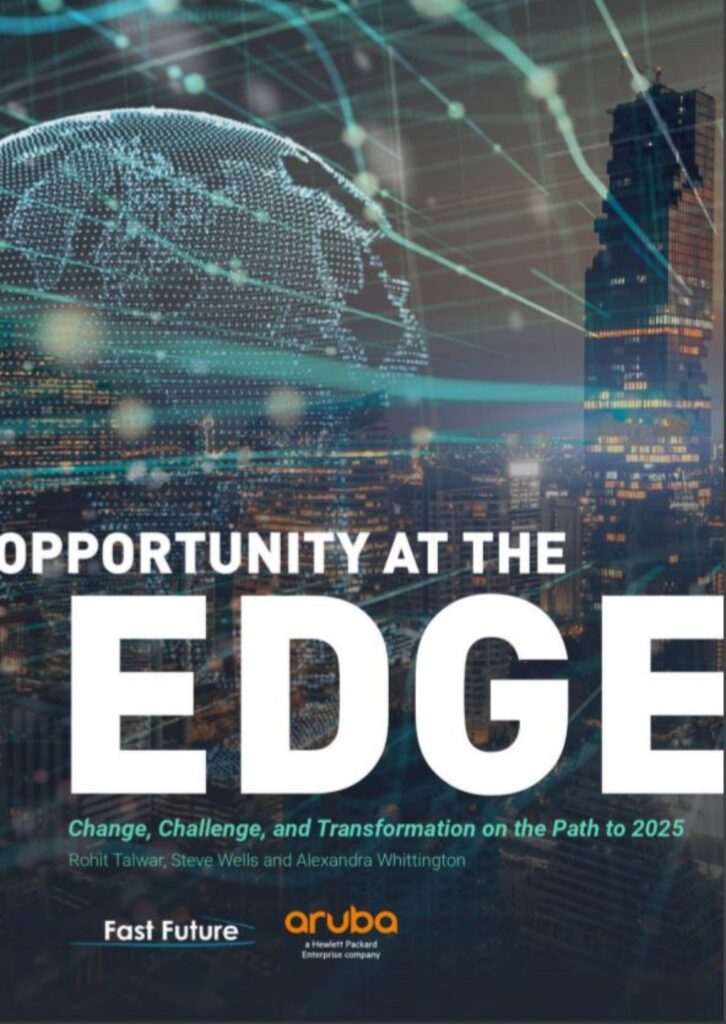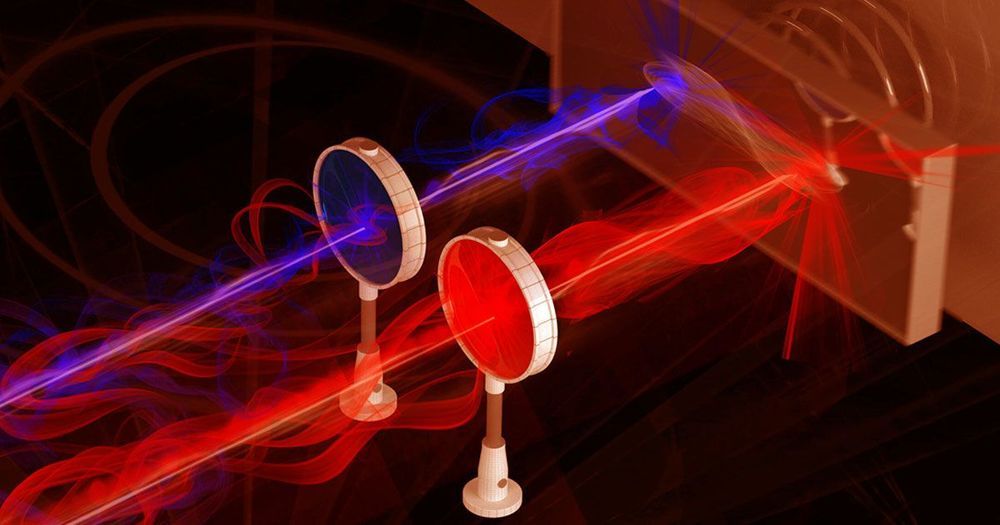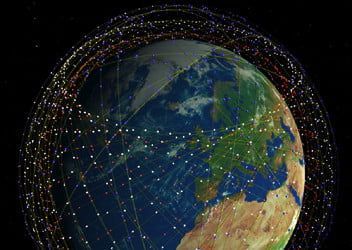It’s a mesh network system that sends data between devices — no cell towers, Wi-Fi hotspots or Bluetooth needed.
Category: internet – Page 242
To work, quantum computers have to be freezing cold, which makes connecting them to one another a challenge.
Now, for the first time, a team of researchers has found a way to create entangled radiation using a physical object — a move that could help connect future quantum computer systems to the outside world.
“What we have built is a prototype for a quantum link,” Shabir Barzanjeh, the engineer who led the project, said in a press release. “The oscillator that we have built has brought us one step closer to a quantum internet.”

The next five years will mark a dramatic enterprise shift toward the edge of networks, where emerging technologies can be harnessed to radically improve user experiences, transform business models, and generate vast revenue opportunities, according to a new book by Fast Future in collaboration with Aruba, a Hewlett Packard Enterprise company.
Opportunity at the Edge: Change, Challenge, and Transformation on the Path to 2025, developed by Fast Future in collaboration with Aruba, reports that edge technologies – those which process and analyze user data where people connect to a network – will revolutionize corporate strategies, create more dynamic, responsive, and personalized customer and employee experiences, enable powerful business and revenue models, and even catalyze the growth of entirely new industries. To unlock these opportunities, the book argues that enterprises must embrace fundamental change, engaging in widespread strategic, structural, and leadership transformation.
Morten Illum, VP EMEA at Aruba, comments: “The findings in this book highlight the vast commercial potential for enterprises utilizing edge technologies, if companies are willing and able to enact the considerable organizational changes needed. The edge represents a dramatic overhaul in how companies understand, service, and meet the needs of their customers and employees. It will be a world defined by dynamic, immediate, and personalized services.”
Key Themes and Findings
Commissioned to explore the scale of possibilities presented by edge technologies in the next 3–5 years, the book features insights from 19 leading global CIOs, technology leaders, industry experts and futurists, and a perspectives survey of 200 future thinkers from across the globe. It explores the edge technologies that are driving change, the use cases and businesses opportunities these are creating, and the ways in which organizations can adapt to take advantage. Key trends that emerged include:
- The edge of the network holds the key to industry transformation: The edge is designed to enable and capitalize on modern digital experiences at the convergence of people, apps, and things – allowing customer and ecosystem partners to take these actionable insights to then create “experiences” for employees and customers. This is making it possible for businesses and organizations in various industries to leverage data and insights from the edge to deliver new and immersive experiences to consumers and end customers. It is driving sectors from education and retail to healthcare and hospitality to rethink how they act today. New types of experiences such as location-aware mobile engagement, digitally assisted patient care, and user-aware meeting rooms can give organizations a competitive advantage.
- At least one-third of businesses will create edge-enabled mainstream personalization by 2025: The study shows that a clear majority (67%) of respondents believe at least 30% of businesses will be using the edge to create “mainstream personalization” in the next five years. From the classroom to the office, retail stores, and major event venues, edge technologies will enable personalized service delivery that meets growing user expectations of an immediate, customized experience.
- New benefits from the edge will be realized: Other benefits arising include localized products, services, and pricing (52% of respondents), enhanced real-time market insight (50%), improved customer and user satisfaction (48%), and faster product and service innovation (47%).
Opportunities at the Edge
Mars has to have its own internet because no one’s going to wait 20 minutes for a download.
After a string of delays, SpaceX’s Starlink project was finally launched last month. The ambitious aim of the project is to create a “global broadband” system by launching a network of satellites which will eventually be able to give fast internet access from anywhere, even remote locations which currently can’t get broadband internet access.
The project is moving ahead at a considerable pace, with aims to have the first internet access provided by 2021. It may take until November 2027 to get all of the satellites required for the global network launched and into place, but a basic version of the service may be possible with around 1,000 satellites. Within the U.S., some version of the service could be available with just 400 satellites in place.
Naturally, a project of this magnitude requires a huge logistical undertaking and a lot of knowledge from a lot of different sectors. And you can see the takeoff of interest in the Starlink project within SpaceX by analyzing the company’s hiring practices.
Whether you call it Industry 4.0, the Industrial Internet of Things (IIoT), or Smart Manufacturing, the power of technology is being felt throughout the industrial world and fundamentally changing value chains and production methods. Indeed, so great is the change that Capgemini’s Digital Transformation Institute predicts that smart factories could add as much as $1.5 trillion to the overall output of the industrial sector in the next five years. This is because of the turbo-charge effect of smart technology, which is enabling factories to produce more while lowering costs. According to Capgemini, some industries may almost double their operating profit and margin.
Human sensory and motor systems provide the natural means for the exchange of information between individuals, and, hence, the basis for human civilization. The recent development of brain-computer interfaces (BCI) has provided an important element for the creation of brain-to-brain communication systems, and precise brain stimulation techniques are now available for the realization of non-invasive computer-brain interfaces (CBI). These technologies, BCI and CBI, can be combined to realize the vision of non-invasive, computer-mediated brain-to-brain (B2B) communication between subjects (hyperinteraction). Here we demonstrate the conscious transmission of information between human brains through the intact scalp and without intervention of motor or peripheral sensory systems. Pseudo-random binary streams encoding words were transmitted between the minds of emitter and receiver subjects separated by great distances, representing the realization of the first human brain-to-brain interface. In a series of experiments, we established internet-mediated B2B communication by combining a BCI based on voluntary motor imagery-controlled electroencephalographic (EEG) changes with a CBI inducing the conscious perception of phosphenes (light flashes) through neuronavigated, robotized transcranial magnetic stimulation (TMS), with special care taken to block sensory (tactile, visual or auditory) cues. Our results provide a critical proof-of-principle demonstration for the development of conscious B2B communication technologies. More fully developed, related implementations will open new research venues in cognitive, social and clinical neuroscience and the scientific study of consciousness. We envision that hyperinteraction technologies will eventually have a profound impact on the social structure of our civilization and raise important ethical issues.
Citation: Grau C, Ginhoux R, Riera A, Nguyen TL, Chauvat H, Berg M, et al. (2014) Conscious Brain-to-Brain Communication in Humans Using Non-Invasive Technologies. PLoS ONE 9: e105225. https://doi.org/10.1371/journal.pone.
Editor: Mikhail A. Lebedev, Duke University, United States of America.
Breakthrough demonstrations using defective diamonds, high-flying drones, laser-bathed crystals and other exotica suggest practical, unhackable quantum networks are within reach.
- By Anil Ananthaswamy on June 19, 2019
IoT has arrived on the factory floor with the force of Kool-Aid Man exploding through walls.
Spotlight: FBI Pushes Forward with Massive Biometric Database Despite Privacy Risks.
The Electronic Privacy Information Center (EPIC) focuses public attention on emerging civil liberties, privacy, First Amendment issues and works to promote the Public Voice in decisions concerning the future of the Internet.








